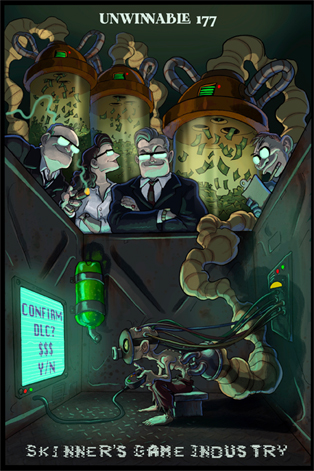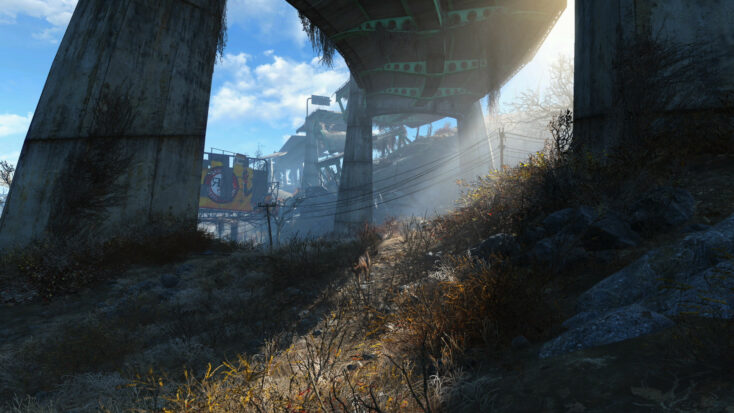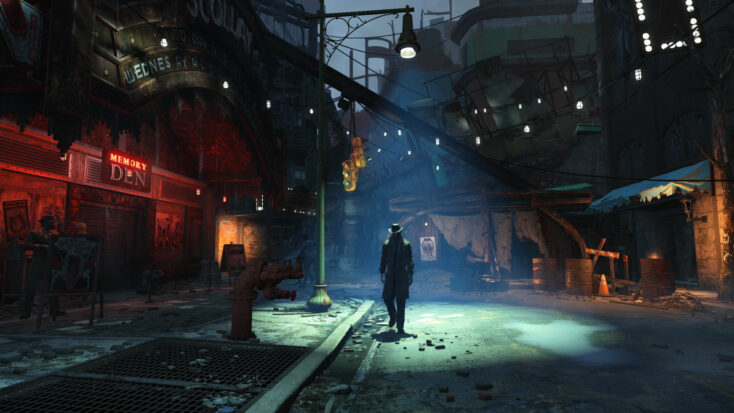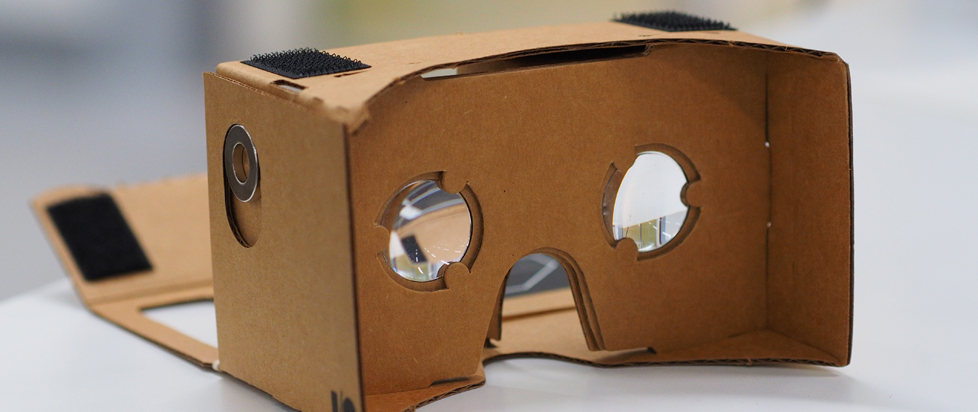
Memories of a Commonwealth

This column is a reprint from Unwinnable Monthly #177. If you like what you see, grab the magazine for less than ten dollars, or subscribe and get all future magazines for half price.
———
Now this.
———
When I returned to St. Louis after living in Boston for half a decade, I found myself flooded by memories of the city. Roads I used to drive down, full of anxiety about my upcoming shift valeting cars downtown; parks I spent hours in, pelting my friends with paintballs or lighting fires with anything flammable; houses where high school parties got busted and we had to beat feet. The city is full of miscellaneous encounters I’ve had over the years.
But those types of memories aren’t limited to physical places. After watching a single episode of the new Fallout TV show a couple months ago, I (and apparently millions of other people) redownloaded Fallout 4 and dove back into the Commonwealth. As a fan of Fallout 3 and Fallout: New Vegas, I originally picked up Fallout 4 not long after its release in 2015 and began playing compulsively. Unlike some, the settlement building mechanic drew me in, and I was obsessed with growing my towns and protecting my settlers. Soon after, I learned I was going to move to Boston, and immediately dove back in to see how my new digs would line up with the compressed version I had already experienced.
Suddenly, the world of Fallout 4 was more real, and more memorable than ever. I basically worked for the Institute, lived next door to the Brotherhood of Steel’s home base, and wandered around the old church where the Railroad made its hideout. Faneuil Hall was no longer an abstraction, but a distinct place that I knew well, and knew how the designers got it wrong. The memories of my lived life stacked on top of my virtual memories of Fallout 4.
Then, after a few hundred hours of play in the Commonwealth, I stopped playing. Other games came and went. I roamed the 1800s West in Red Dead Redemption II; I raided the Mediterranean and English Channel in Assassin’s Creed; I created whole worlds in Minecraft.

Suddenly though, after at least five years of not touching Fallout 4, I’m back in the Commonwealth, and the memories flood back to me, just like when I came back to St. Louis. Oh, that pack of raiders right around this corner in the North End is deadly; there’s a Mirelurk Queen who lives right in this swamp that I need to avoid until I’m leveled enough; the Deliverer is obviously the best gun in the game.
The texture of these memories is layered, full of personal memories (my wife laid up after knee surgery) and physical reminders (the soundtrack for Nuka-World obviously has to be Young Thug’s Jeffrey). Boston landmarks stand out, drawing me back to eating tacos on the Harvard Yard and listening to Rage Against the Machine, driving north through Revere on Route 1A heading up to Far Harbor, or learning that the Combat Zone was a real place of danger, before it became a tourist trap.
I’ve lived in a number of cities over my life, but my memories of Boston seem to feel stronger, maybe because of my time in Fallout 4. The layers feel like they stack on themselves, so when I reach back and picture digging through my cousin Billy’s fridge in Quincy, I can almost picture the raiders at the same time. Or when my wife and I spent an afternoon on Deer Island, fighting off an invasion of super-mutants. For all my love of St. Louis, this level of memory doesn’t exist in the same way, because I never spent time there virtually as well as physically.
When we first moved out to Boston, we met my aunt and uncle (who have lived there most of their lives) for a drink at the Shamrock Tavern on the South End. After a few rounds of Gwinnett Stouts, they were loose enough to let us in on a vital secret they knew about my new workplace.
“They’re making fake people,” my aunt hoarsely whispered. “Synths, who can replace you at a moment’s notice.”
Suddenly, my entire life whirled around me. My new job, the one I had worked my whole life to get was based on a false reality. I had to learn more, and the more I dug, the more I wished I hadn’t found out anything at all. After all, how was I, a lowly book editor with a decent intelligence and charisma level but low endurance and even less perception going to survive in the hellish Bostonian wasteland.

Only by returning to St. Louis can I now reflect on just how lucky I was to survive that traumatic experience out on the East Coast, but the memories persist. After my aunt and uncle revealed the truth, I had to make a choice: would I keep my current position, knowing that my employer was working on something that could potentially end mankind? Or, should I join up with an underground force and seek to end their domination of what the Institute clearly felt was an inferior species? Or, and this is perhaps my least favorite idea, should I join the military, the cops, the fucking fascists? I was in my early thirties – I had options.
It was only after traveling south, past the Glowing Sea to Taunton, just north of Providence, that I knew what choice I had to make. I was meeting with a potential author, Virgil, who had experienced a life altering mutation at the hands of the Institute – you could hardly call him human anymore. I knew after hearing his book pitch, that I had to reveal the truth. I had to tell his story and publish his book, no matter the cost to my career. I traipsed back to Diamond City and filled Piper in, and we launched the new serialized periodical and later a bound book, confronting everything my now former employer was doing.
In hindsight, it was a foolish maneuver, but it felt only right at the time. It was the only way to stop the oncoming war. It was the only way to keep the tentative peace that had evolved since the bombs fell over 200 years ago. Because the most important thing I could do in Boston was prevent a new war. Because war…
War never changes.
———
Noah Springer is a writer and editor based in St. Louis. You can follow him on Twitter @noahjspringer.




